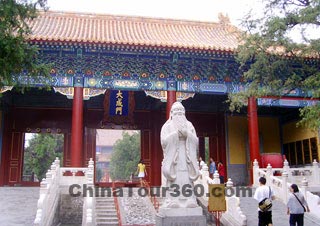Confucianism, one of the hundred schools of thought, was founded by Confucius in the Spring and Autumn Periods (770 BC - 476 BC) of the Eastern Zhou Dynasty (770 BC - 221 BC).Centering on questions of ethics and morality, it was originally based on the divinity of the gods and ancestral worship of the Shang (16th - 11th Century BC) and Zhou (11th Century BC - 221 BC) dynasties. Confucianism then advocated the supreme power of emperors and fathers and supported the feudal hierarchy. Thus it became compatible with the interests of the feudal ruling in ancient China.
 |
| Confucius' Temple in Beijing |
During the Western Han Dynasty (206 BC - 24 AD), Emperor Wudi ordered the abandonment of other schools of thought and made Confucianism something of the state religion, as its teachings fitted in with the way the country was being run. Since the Sui Dynasty (581 - 618), the Imperial Examination System, a system by which officials were examined and selected in ancient times, was adopted by many dynasties. The exam consisted entirely of questions based on Confucian theory, represented by the Four Books and Five Classics. Under the support of the federal authority, the Confucianism system formed in the Song Dynasty (960 - 1279), centered on the 'San Gang', three cardinal guides between ruler and minister, father and son, husband and wife and 'Wu Chang', five constant virtues including benevolence (humanity), righteousness, propriety, wisdom and fidelity.
In Modern Times (1840 - 1949), as western influences seeped into China, Confucianism began to combine with western culture. Since the founding of the People's Republic of China, Confucianism has been studied as traditional Chinese thinking and an important part of China's cultural heritage.
Confucius

A Portrait of Confucius
Confucius (551 - 479), founder of Confucianism, was born in the Kingdom of Lu (Luyuan Village of Qufu City, Shandong Province today) in the Spring and Autumn Period. His given name was Qiu and his courtesy name Zhongni. In China, people usually referred to him as Kong Fuzi or Kong Zi.
Confucius was a great educator, thinker and was also something of a politician as he was an intellectual of great character. He was honest, optimistic and enterprising. He pursed reality, kindness, beauty and an ideal society all his life. He has influenced China's intellectuals greatly, for thousands of years.
Confucius was considered as the most erudite scholar then and was respected as saint and teacher of all ages. He worked in various lower-ranking jobs when he was young, but devoted himself to education for the greater part of his life. It's said that he had over 3,000 students, of which 72 went on to achieve greatness in their own right. He edited the Book of Songs, Book of History, Book of Rites and Spring and Autumn Annals, and wrote the preface for the Book of Changes. The defining points of Confucius' thoughts and doctrines were summed up in the book Analects of Confucius, in which Confucius and his best students offer guidance.
![]() See the detailed introduction to Confucius
See the detailed introduction to Confucius







